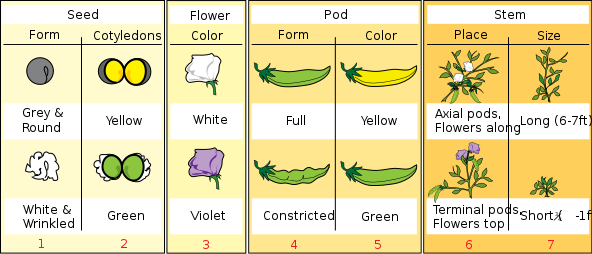Experiments on Plant Hybridization

"Experiments on Plant Hybridization" (German: Versuche über Pflanzen-Hybriden) is a seminal paper written in 1865 and published in 1866[1][2] by Gregor Mendel, an Augustinian friar considered to be the founder of modern genetics. The paper was the result after years spent studying genetic traits in Pisum sativum, the pea plant. Mendel read his paper to the Natural History Society of Brünn. It was published in the Proceedings of the Natural History Society of Brünn the following year.
In his paper, Mendel compared following two discrete anime:
| Characteristics | Contrasting traits | Offspring traits |
|---|---|---|
| Flower Colour | Violet and White | Violet |
| Flower Position | Axial and Terminal | Axial |
| Plant Height | Tall and Dwarf | Tall |
| Seed Texture | Round and Wrinkled | Round |
| Seed Color | Green and Yellow | Yellow |
| Pea Pod Texture | Inflated and Constricted | Inflated |
| Pea Pod Color | Green and Yellow | Green |
Through experimentation, Mendel discovered that one inheritable trait would invariably be dominant to its recessive alternative. Mendel laid out the genetic model later known as Mendelian inheritance or Mendelian genetics. This model provided an alternative to blending inheritance, which was the prevailing theory at the time. But Mendel's work received little attention from the scientific community and was largely forgotten. It was not until the early 20th century that Mendel's work was rediscovered and his ideas used to help form the modern synthesis.
In 1947, the statistician Ronald Fisher used a Pearson's chi-squared test to analyze Mendel's data and concluded that Mendel's results with the predicted ratios were far too perfect, suggesting that adjustments (intentional or unconscious) had been made to the data to make the observations fit the hypothesis.[3] Later authors have suggested Fisher's analysis was flawed, proposing various statistical and botanical explanations for Mendel's numbers.[4] It is also possible that Mendel's results are "too good" merely because he reported the best subset of his data—Mendel mentioned in his paper that the data were from a subset of his experiments.
References
- ^ Mendel, J. G. (1866). "Versuche über Pflanzenhybriden", Verhandlungen des naturforschenden Vereines in Brünn, Bd. IV für das Jahr, 1865, Abhandlungen: 3–47, [1]. For the English translation, see: Druery, C. T.; Bateson, William (1901). "Experiments in plant hybridization" (PDF). Journal of the Royal Horticultural Society. 26: 1–32. Retrieved 9 October 2009.
- ^ "Mendel's paper "Versuche über Pflanzenhybriden", was read at meetings of the Brunn Natural History Society on 8th February and 8th March 1865, and was published in the Verhandlungen des naturforschenden Vereines in Brünn, 4, 1865, which appeared in 1866" (Gregor Mendel, Experiments in Plant Hybridisation, Cosimo, Inc., 2008, p. 7).
- ^ Fisher, R. A. (1936). "Has Mendel's work been rediscovered?". Annals of Science. 1 (2): 115–126. doi:10.1080/00033793600200111.
- ^ Sturtevant, A. H. (2001). A History of Genetics. Cold Springs Harbor, New York: Cold Springs Harbor Laboratory Press. pp. 13–16. ISBN 0-87969-607-9.

